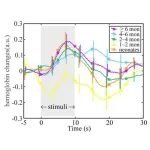(Press-News.org) SAN DIEGO ― The targeted therapy bezuclastinib was safe and rapidly reduced markers of disease burden while also improving symptoms for patients with a rare blood disorder called nonadvanced system mastocytosis, according to results of the Phase II SUMMIT trial reported by researchers at The University of Texas MD Anderson Cancer Center.
The findings, presented today at the 2023 American Society of Hematology (ASH) Annual Meeting, demonstrate that all participants treated with bezuclastinib achieved at least a 50% reduction in markers of disease burden and 63% reported their disease symptoms eased within 12 weeks. That number increased to 78% after an additional eight weeks of treatment, at which time all patients also reported an improvement in pain symptoms.
“The era of targeted therapy offers hope, not just for alleviating symptoms but for getting to the root of the condition,” said principal investigator Prithviraj Bose, M.D., professor of Leukemia. “Bezuclastinib provides precision targeting without the typical central nervous system or bleeding side effects often associated with similar drugs."
Systemic mastocytosis (SM) is a rare disease marked by the buildup of malignant mast cells in the bone marrow and other tissues. These high levels of abnormal mast cells can lead to a multitude of symptoms due to the release of chemicals called mediators. SM can range from non-advanced (NonAdvSM) to advanced disease (AdvSM), with symptoms that can include brain fog and skin rashes to gut issues and life-threatening anaphylaxis.
In up to 95% of patients, SM is driven by the KIT D816V gene mutation. Treatments targeting this mutated kinase have been used for AdvSM variants, but they are known to have off-target activity that can cause toxicities that restrict dosing and, therefore, limit efficacy.
There are two variants within NonAdvSM: indolent systemic mastocytosis (ISM) and smoldering systemic mastocytosis (SSM). ISM, which affects the majority of patients with SM, is characterized mostly by symptoms related to mast cell degranulation and mediator release. SSM is identified by a higher mast cell burden, marked by high levels of blood enzymes like serum tryptase, but without resulting organ damage.
Bezuclastinib is a potent type-1 tyrosine kinase inhibitor that blocks mutant KIT D816V activity while sparing other kinases, minimizing the potential for off-target side effects. In a separate, prior studies, the drug demonstrated minimal brain penetration in animals and no central nervous system toxicities in patients with AdvSM.
The first part of the SUMMIT trial followed 20 patients with NonAdvSM for a median duration of seven months. The majority were female (75%) with a median age of 50. Seventy-five percent of patients had the KIT D816V mutation, and all had moderate-severe symptoms. Patients were treated with either 100 or 200 mg of bezuclastinib or with placebo. All patients continued to receive their baseline anti-mediator treatments throughout the trial.
Researchers evaluated the efficacy of bezuclastinib through multiple patient-reported outcome measures and changes in markers of disease burden, such as serum tryptase, bone marrow mast cell percentage and KIT D816V mutation allele burden.
Patients who received the 100 mg dose experienced a median reduction in symptoms of 48.5% after 12 weeks. During this period, none of the patients in the placebo group reported significant improvement in their overall symptoms. However, after transitioning those patients to bezuclastinib treatment, 67% reported an improvement in their symptoms after four weeks.
After 20 weeks, more patients observed greater improvements in dermatological symptoms (78%), gastrointestinal symptoms (33%) and cognitive symptoms (33%) compared to the 12-week mark.
Adverse events generally were mild and reversible, with the most frequent being a change in hair color, nausea and peripheral edema. No serious adverse events related to bezuclastinib were reported in the 100 mg or 200 mg cohorts.
"This drug may offer great promise in the treatment of non-advanced systemic mastocytosis," Bose said. "As we move forward, our aspiration is to optimize the dosage while maintaining a robust safety profile.”
To futher assess the drug’s efficacy in patients with NonAdvSM, next steps for the SUMMIT trial include comparing bezuclastinib against placebo once the optimal dose has been determined. Part Ib of the trial will investigate 100mg and 150 mg daily doses that use a different formulation of the drug, and those results are expected in 2024, Bose explained.
The SUMMIT trial was sponsored by Cogent Biosciences. Bose reports relationships with Cogent Biosciences, GSK, Novartis, Karyopharm, AbbVie, PharmaEssentia, Jubilant, Morphic, Kartos, Telios, Disc, Jassen, Geron, Ionis, Incyte, Bristol Myers Squibb, Sobi, MorphoSys, Blueprint and Sumitomo. A full list of co-authors and disclosures can be found with the abstract.
Read this press release in the MD Anderson Newsroom.
END
ASH: Targeted oral therapy reduced disease burden and improved symptoms for patients with rare blood disorder
Bezuclastinib was safe and rapidly lowered markers of disease burden for patients with nonadvanced systemic mastocytosis in Phase II trial
2023-12-09
ELSE PRESS RELEASES FROM THIS DATE:
New Sylvester cancer study provides insight into underlying gene mutations in myelodysplastic syndromes
2023-12-09
EMBARGOED UNTIL DECEMBER 9, 2023, AT 12:45 P.M. ET
A new study from researchers with Sylvester Comprehensive Cancer Center at the University of Miami Miller School of Medicine and collaborating organizations provides insight into the underlying mechanisms of gene mutations commonly seen in patients with myelodysplastic syndromes (MDS) and other myeloid neoplasms.
Their findings, to be presented at ASH 2023, the American Society of Hematology’s annual meeting in Santa Diego, Dec. 9-12, could lead to development of more effective drug combinations ...
First-in-human clinical trial of CAR T cell therapy with new binding mechanism shows promising early responses
2023-12-09
SAN DIEGO – Early results from a Phase I clinical trial of AT101, a new CAR T cell therapy that uses a distinct binding mechanism to target CD19, show a 100 percent complete response (CR) rate at the higher dose levels studied in the trial, according to researchers from the University of Pennsylvania Perelman School of Medicine and Penn Medicine’s Abramson Cancer Center. The findings were published today in Molecular Cancer and presented at the 65th American Society of Hematology (ASH) Annual Meeting ...
Long-term results show combination treatment that skips chemotherapy is effective for older patients with Ph+ ALL
2023-12-09
Older patients with Philadelphia chromosome-positive (Ph+) acute lymphoblastic leukemia (ALL) who were not good candidates for the standard treatment of intensive chemotherapy had a median overall survival (OS) of 6.5 years on an alternate regimen of dasatinib and blinatumomab.
These long-term results from the S1318 clinical trial will be presented at the 65th American Society of Hematology (ASH) Annual Meeting and Exposition in San Diego on December 9 (abstract 1499).
Anjali S. Advani, MD, a SWOG investigator at Cleveland Clinic Cancer Institute, led the study, with ...
Mindfulness could help women with opioid use disorder better control drug urges
2023-12-09
Mindfulness-Oriented Recovery Enhancement (MORE) — a behavioral intervention that integrates training in mindfulness, emotion regulation strategies and savoring of natural rewards — could hold the key to mitigating relapse in women undergoing medically assisted opioid use disorder treatment, a Rutgers study found.
The pilot study published in the journal Explore, is the first to evaluate the potential neural changes that underlie women’s emotion regulation and craving after an eight-week MORE intervention.
Previous studies have shown that women report higher opioid craving and show a greater inability to ...
TTUHSC’s ARPA-H membership will spur innovation, improve access for West Texas patients
2023-12-09
Imagine if scientists developed a customizable cancer vaccine that was available — and affordable — for everyone. What if a patient scheduled for surgery also had the option of taking a pill whose composition includes nanorobotics capable of performing the procedure?
These and other medical scenarios may seem far-fetched and better suited to a science fiction thriller. However, the Advanced Research Projects Agency for Health (ARPA-H) is seeking to take such ideas from the drawing board to ...
Global annual finance flows of $7 trillion fueling climate, biodiversity, and land degradation crises
2023-12-09
Almost US$7 trillion per year in government subsidies and private investment - around 7 per cent of global GDP - has a direct negative impact on nature.
Nature-based solutions remain dramatically underfunded. Current public and private finance flows are only US$200 billion per year. To meet climate, biodiversity, and restoration targets, this needs to triple by 2030 and quadruple by 2050.
Realignment of public and private nature-negative finance flows is urgently needed
Dubai, 9 December 2022 – Close to $7 trillion is invested globally each year in activities that have a direct negative impact on nature from both public and private sector sources - equivalent to ...
Tracing how the infant brain responds to touch with near-infrared spectroscopy
2023-12-09
Tokyo, Japan – Researchers from Tokyo Metropolitan University have measured how oxygenated hemoglobin levels in the blood change in infants’ brains in response to touch. Using spectroscopy methods with external sensors placed on the scalp of sleeping infants, they found that the time at which levels peak doesn’t change with infant age, but the amount by which it varies over time does. Insights like this shed light on how the physiology of infants develop.
The first phase of a newborn’s life is a dazzling array of rapid developmental ...
These are the world's most effective charities
2023-12-09
Which charities will be most effective in ensuring your donation is put to good use? For the first time in the Netherlands, researchers applied scientific methods to pinpoint which charities achieve the most with the donations they receive. The University of Amsterdam and Stichting Doneer Effectief (Donate Effectively Foundation) unveiled the list on Friday, 8 December, during a sold out evening in Rotterdam. ‘We are talking about the Champions League of good causes,’ says professor of Philanthropy & Sustainable Investment Paul Smeets of the University of Amsterdam. The ranking ...
When is an aurora not an aurora?
2023-12-08
The shimmering green, red and purple curtains of the northern and southern lights — the auroras — may be the best-known phenomena lighting up the nighttime sky, but the most mysterious are the mauve and white streaks called Steve and their frequent companion, a glowing green "picket fence."
First recognized in 2018 as distinct from the common auroras, Steve — a tongue-in-cheek reference to the benign name given a scary hedge in a 2006 children's movie — and its associated picket fence were nevertheless thought to be caused by the same physical processes. But scientists were left scratching their heads about how these glowing emissions ...
Advisory panel issues field-defining recommendations for US government investments in particle physics research
2023-12-08
The High Energy Physics Advisory Panel (HEPAP) to the High Energy Physics program of the Office of Science of the U.S. Department of Energy and the National Science Foundation’s Division of Physics has released a new Particle Physics Project Prioritization Panel (P5) report, which outlines particle physicists’ recommendations for research priorities in a field whose projects — such as building new accelerator facilities — can take years or decades, contributions from thousands of scientists, and billions of dollars.
The 2023 P5 report represents the major activity in the field of particle physics that ...
LAST 30 PRESS RELEASES:
Cell and gene therapy across 35 years
Rapid microwave method creates high performance carbon material for carbon dioxide capture
New fluorescent strategy could unlock the hidden life cycle of microplastics inside living organisms
HKUST develops novel calcium-ion battery technology enhancing energy storage efficiency and sustainability
High-risk pregnancy specialists present research on AI models that could predict pregnancy complications
Academic pressure linked to increased risk of depression risk in teens
Beyond the Fitbit: Why your next health tracker might be a button on your shirt
UCSB scientists bottle the sun with liquid battery
Lung cancer drug offers a surprising new treatment against ovarian cancer
When consent meets reality: How young men navigate intimacy
Siemens Healthineers and Mayo Clinic expand strategic collaboration to enhance patient care through advanced technology
Physicists develop new protocol for building photonic graph states
OHSU-led research initiative examines supervised psilocybin
New review identifies pathways for managing PFAS waste in semiconductor manufacturing
New research finds state-level abortion restrictions associated with increased maternal deaths
New study assesses potential dust control options for Great Salt Lake
Science policy education should start on campus
Look again! Those wrinkly rocks may actually be a fossilized microbial community
Exposure to intense wildfire smoke during pregnancy may be linked to increased likelihood of autism
Children with Crohn’s have distinct gut bacteria from kids with other digestive disorders
Genomics offers a faster path to restoring the American chestnut
Caught in the act: Astronomers watch a vanishing star turn into a black hole
Why elephant trunk whiskers are so good at sensing touch
A disappearing star quietly formed a black hole in the Andromeda Galaxy
Yangtze River fishing ban halts 70 years of freshwater biodiversity decline
Genomic-informed breeding approaches could accelerate American chestnut restoration
How plants control fleshy and woody tissue growth
Scientists capture the clearest view yet of a star collapsing into a black hole
New insights into a hidden process that protects cells from harmful mutations
Yangtze River fishing ban halts seven decades of biodiversity decline
[Press-News.org] ASH: Targeted oral therapy reduced disease burden and improved symptoms for patients with rare blood disorderBezuclastinib was safe and rapidly lowered markers of disease burden for patients with nonadvanced systemic mastocytosis in Phase II trial



